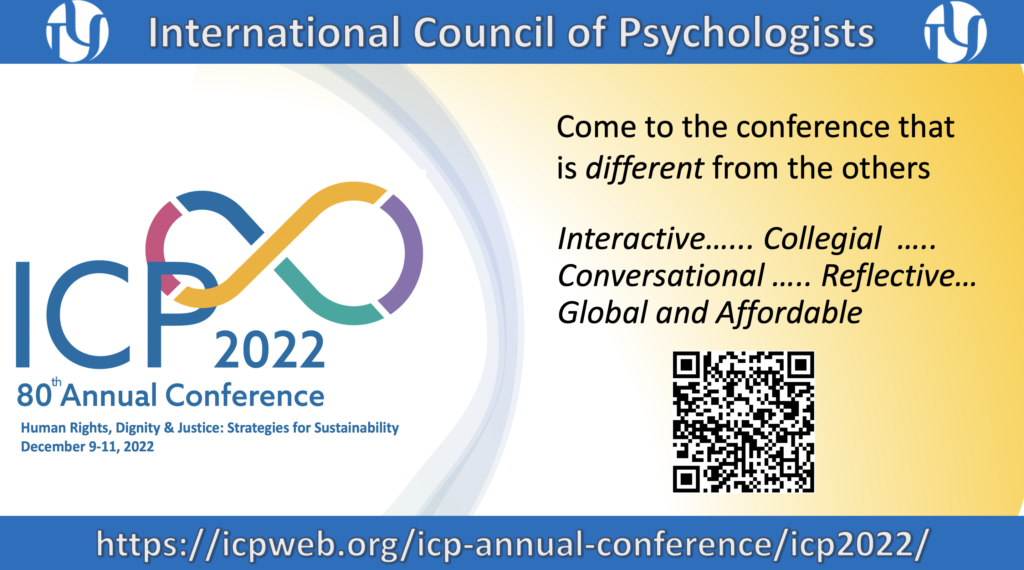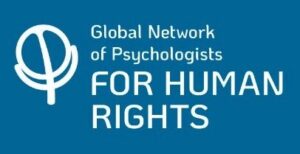
Editor’s Note
The focus in this month’s Bulletin is on the International Day of the World’s Indigenous Peoples on August 9.

Table of Contents
SPECIAL FOCUS: International Day of the World’s Indigenous Peoples
SPECIAL SECTION
SPECIAL FOCUS on the International Day of the World’s Indigenous Peoples, August 9
https://www.un.org/en/observances/indigenous-day
Did you know?
- Globally, 47% of all indigenous peoples in employment have no education, compared to 17% of their non-indigenous counterparts. This gap is even wider for women.
- More than 86% of indigenous peoples globally work in the informal economy, compared to 66% for their non-indigenous counterparts
- Indigenous Peoples are nearly three times as likely to be living in extreme poverty compared to their non-indigenous counterparts.
Indigenous youth as agents of change for self-determination
Violations of the rights of the world’s Indigenous Peoples have become a persistent problem, sometimes because of a historical burden from their colonization backgrounds and others because of the contrast with a constantly changing society.
In response to this problem, let’s remember every August 9 that Indigenous Peoples have the right to make their own decisions and carry them out meaningfully and culturally appropriate to them. In this context of demand for self-determination, Indigenous youth are working as agents of change at the forefront of some of the most pressing crises facing humanity today.
For instance, Indigenous youth are harnessing cutting-edge technologies and developing new skills to offer solutions and contribute to a more sustainable, peaceful future for our people and planet.
But their future depends as well on the decisions that are made today. Their representation and participation in global efforts towards climate change mitigation, peacebuilding, and digital cooperation are crucial for the effective implementation of their rights as indigenous.
This International Day of Indigenous Peoples 2023, under the title of “Indigenous youth as agents of change for self-determination”, revindicates the role that indigenous youth must occupy in decision-making while recognizing their dedicated efforts in climate action, the search for justice for their people, and the creation of an intergenerational connection that keeps their culture, traditions, and contributions alive.
We need indigenous communities for a better world
There are an estimated 476 million indigenous peoples in the world living across 90 countries. They make up less than 5 per cent of the world’s population, but account for 15 per cent of the poorest. They speak an overwhelming majority of the world’s estimated 7,000 languages and represent 5,000 different cultures.
Indigenous Peoples are inheritors and practitioners of unique cultures and ways of relating to people and the environment. They have retained social, cultural, economic and political characteristics that are distinct from those of the dominant societies in which they live. Despite their cultural differences, indigenous peoples from around the world share common problems related to the protection of their rights as distinct peoples.
Indigenous Peoples have sought recognition of their identities, their way of life and their right to traditional lands, territories and natural resources for years. Yet, throughout history, their rights have been violated. Indigenous Peoples today, are arguably among the most disadvantaged and vulnerable groups of people in the world. The international community now recognizes that special measures are required to protect their rights and maintain their distinct cultures and way of life.
In order to raise awareness of the needs of these population groups, every 9 August commemorates the International Day of the World’s Indigenous Peoples, chosen in recognition of the first meeting of the UN Working Group on Indigenous Populations held in Geneva in 1982.
August 9, 2023, 9:00 – 10:30 a.m. EDT, New York time
Register for the UN event where speakers will share their expertise and experience about the role of Indigenous youth in exercising self-determination in the context of climate action and the green transition, mobilizing for justice, and intergenerational connections.
E-learning tool on the rights of indigenous peoples, OHCHR
Through this online learning tool, participants will increase their knowledge and understanding of the rights of indigenous peoples, as recognized in the United Nations Declaration on the Rights of Indigenous Peoples (UNDRIP) and in other international instruments. Learn how to cooperate with the UN’s Human Rights and other Mechanisms to advocate for the rights of indigenous peoples.
This UN Human Rights Office e-learning tool includes explanations on the key provisions of the UN Declaration on the Rights of Indigenous Peoples, real stories and case studies on how indigenous rights are translating into real life situations, possible actions by the United Nations mechanisms, activities and quizzes, tools and resources.
Once you successfully complete the course, you will get a certificate from the UN Human Rights Office.
To get started, visit https://elearning.ohchr.org/login/index.php

Special GNPHR Blog:
A clinical psychologist’s journey into working with Indigenous clients
by Dr. Josephine H. Tan
Related article:
A Call to Reconsider the Métis Self-Government Agreement in Ontario. Jennifer Meness, Damien Lee, Geraldine King, Brock Pitawanakwat, Veldon Coburn, Tricia McGuire-Adams, Celeste Pedri-Spade, waaseyaa’sin Christine Sy, Yellowhead Brief #135, Yellowhead Institute, 16 June 2023. A Call to Reconsider the Métis Self-Government Agreement in Ontario.
GNPHR NEWS AND EVENTS
Psychology Organizations and Human Rights
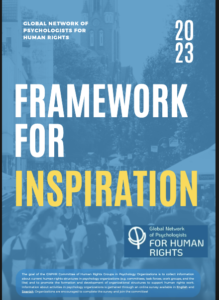
- GNPHR Network of Human Rights Committees in Psychology Organizations
Framework for Inspiration. This online booklet is for psychology or psychology-related organizations who are interested in incorporating human rights perspectives or work into their organization.
The Network of Human Rights Groups in Psychology Associations is open to representatives of psychology associations that have established a committee, office, or subgroup focused on psychology and human rights. If you are interested in joining the group please register your interest here https://humanrightspsychology.org/home/about/interest-form-gnphr-working-group/
Webinar Series Human Rights Education
Next Webinars:
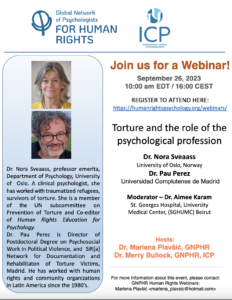 Dr. Nora Sveaass & Dr. Pau Perez – Torture and the Role of the Psychological Profession.
Dr. Nora Sveaass & Dr. Pau Perez – Torture and the Role of the Psychological Profession.
September 26, 2023, 10 am EDT / 4 pm CEST / 14:00 UTC
Register: https://us02web.zoom.us/webinar/register/WN_fU8o7h1cSnmDtjqjbbOWaw#/registration
CONTENT AREAS AND NEWS
General
Interpreting human rights as the social psychological phenomenon of rights claiming.
George Drazenovich and Mirella Stroink, Lakehead University, Ontario, Ca, International Journal of Psychology, 2 July 2023.
In the last 5 years, the intersection between psychology and human rights has become more evident, with influential international, national and local human rights institutions, including the American Psychological Association, issuing reports and resolutions on the topic. Within jurisprudence, human rights are less of a legalistic regulatory enactment and more of what social psychologists refer to as injunctive norms. We argue that conceptualising human rights as the social-psychological process of both creating and aligning injunctive and descriptive norms clarifies human rights and makes them more accessible to groups and individuals in society engaged in rights claiming. Rights claiming is a term we use to describe the moral cognitive process of people engaged in individual and/or collective behaviour aimed at securing their social identity within the public sphere where that identity is marginalised or the subject of discrimination. We argue that placing rights claiming at the centre of human rights psychology advances human rights. Focusing psychological research on social identity, the alignment of injunctive norms, deontic moral cognitions, human dignity, social dominance orientations and collective and individual behaviours forms part of securing a clear specialty in psychological science dedicated to human rights and advancing the American Psychological Association (APA)’s human rights mandate.
Academic Freedom / Higher Education
.“Women Academics Face a Double-Edged Sword:”
Dr. Atsede Aregay, Associate Professor of Nursing and Palliative Care, University of Agder on Ethiopian Higher Education. SCHOLARS AT RISK, July 11, 2023.
The recent conflict (starting in 2020, ceasefire signed in November 2022) has brought about a significant decrease in academic freedom and a further politicization of Ethiopian higher education institutions, particularly in the Tigray region. Many institutions have failed to remain neutral during the conflict as a way to curry political favor, materials, and financial resources from the federal government and national defense forces. Moreover, the war has encouraged inter-ethnic discrimination and harassment among members of the Ethiopian academic community in-country and abroad.
As a countermeasure to this destabilization, the diaspora has established various academic networks and initiatives which are now actively involved in rebuilding Tigray including the education sector. For example, Global Society of Tigray Scholars and Professionals (GSTS), headquartered in Germany, is a multisectoral international network of Tigrayan scholars consisting of more than 3000 members, including myself, working for the socioeconomic advancement of the Tigrayan community. While the financial capacity of this organization is limited, its members are from renowned higher institutions in Europe, US, and Australia who are committed to the wider diaspora. I am also actively involved in a network called Australian Based Ethiopian Researchers Network (ABREN).
While Tigrayan academics are facing startling setbacks to their academic careers, women academics face a double-edged sword worsened by the conflict. Despite the improvement in gender equality at Ethiopian universities, the number of women participating in the academia is still very limited. According to recent studies, “women represent less than 10% of the available top-level leadership positions of the 46 [Ethiopian] public universities.
Scholars at Risk (SAR), March 2023
The side event to the 53rd session of the UN Human Rights Council (UNHRC) builds on the success of the Joint Statement on Academic Freedom delivered at the UNHRC Session in March this year, and recent progress in support of academic freedom from the UN special rapporteur on the protection and promotion of the right to freedom of opinion and expression, and continued support from UNESCO. The discussion also introduced new guidance on implementing academic freedom, in the form of new Principles for Implementing the Right of Academic Freedom, available in all six UN languages. The principles were drafted by an international working group coordinated by SAR. Comments on the principles document are invited through the SAR website.
Children/Youth
A Practitioner’s Guide to Working with Children in VE [Violent extremism -Affiliated Families: Protecting the Rights of the Child
Méryl Demuynck, Anna-Maria Andreeva, George Kefford.
PREPARE Project Report, May 2023.
The International Centre for Counter-Terrorism (ICCT) is an independent think and do tank providing multidisciplinary policy advice and practical, solution-oriented implementation support on prevention and the rule of law, two vital pillars of effective counterterrorism.
ICCT’s work focuses on themes at the intersection of countering violent extremism and criminal justice sector responses, as well as human rights-related aspects of counter-terrorism. The major project areas concern countering violent extremism, rule of law, foreign fighters, country and regional analysis, rehabilitation, civil society, engagement and victims’ voices.
Executive Summary
The PREPARE (Promoting collaborative policies of inclusion relating to children of far right and Islamist parents in Western Europe) project aims to identify vulnerabilities and stigmas that children may face when their parents are involved in violent extremist (VE) networks, and how frontline practitioners can best address them through a collaborative approach centred on the needs of the child. It aims to support these children by supporting frontline practitioners working with these children and their families in six European countries (the Netherlands, Spain, France, Sweden, Germany and Kosovo) to develop a state-of-
the-art Child Vulnerability and Intervention Tool and training modules for practitioners.
Central to the PREPARE project is ensuring that human rights, the rule of law, and children’s rights remain at the forefront throughout the development and implementation of interventions and programmes aimed at supporting children of families with links to VE. This report thus aims to provide guidance for practitioners on how to support these children through a human rights-and rule of law-compliant approach, that centres on children’s needs, well-being, and longterm prospects, and helps mitigate the risks of stigmatisation, polarisation, and discrimination.
This report starts by providing an overview of the rights of the child, as defined in the United Nations Convention on the Rights of the Child (UNCRC), including the four general principles that should inform the implementation of all other rights, as well as any decisions and interventions affecting children, namely the non-discrimination principle, the best interests of the child, the child’s inherent right to life, survival and development, and the child’s right to express their views freely. It notably aims to inform practitioners on what these rights are, to what extent children raised in families with links with VE might see some of these rights infringed upon, as well as how they should inform their work.
Finally, this report focuses on providing guidance on identified good practices to support children growing in families with links to VE, which include adopting victim-centred, individually-tailored, gender- and age- conscious approach, developing multidisciplinary and multi-actor programmes, and providing adequate training for practitioners. In addition, the report will further address some of the key challenges and practises to avoid in regards to the safeguarding the rights of children in families with links to VE. Practices to avoid notably include security-centred approaches, one-size-fits-all responses, practices causing re-traumatisation, lack of trust between children and implementers, lack of and/or inadequate training, and lack of long-term funding to ensure sustainable support for children having been exposed to VE environments.
COVID-19
What COVID Revealed About American Psychiatry
George Makari, The New Yorker, July 13, 2023.
As the COVID-19 pandemic eases, a mental-health crisis still has us in its grip. My fellow-psychiatrists and I continue to be flooded with referrals, desperate calls, emergencies, and relapses—likely the consequences of years of isolation and grinding anxiety, loss, school disruption, and who knows what kinds of viral assaults on the brain. Preliminary studies report elevated rates of suicide, anxiety and depression, addiction, developmental delay, and psychiatric E.R. visits. Socially marginal people, health-care workers, and the young all seem especially at risk.
Crimes against humanity
Nelson Mandela: ‘The heroes are those who make peace and build.’
Nelson Mandela and the Struggle Against Apartheid (2010). Nelson Mandela International Day 18 July. In this special programme for the first Nelson Mandela International Day (2010), UN Radio’s Ben Malor looks back briefly at the struggle against apartheid and the campaign for Nelson Mandela’s release in which the United Nations played an important role. We hear from key figures, who have worked closely with Mandela, including anti-apartheid activist Denis Goldberg, South African musician Hugh Masekela, and Ibrahim Gambari, the last Chairman of the UN Special Committee Against Apartheid. The programme opens with Nelson Mandela’s first address to the UN General Assembly as President of South Africa.
The legacy of Eugenics Past and Present
A symposium at the European Congress of Psychology, organised by the BPS Challenging Histories group. The first speaker was Professor Marius Turda, and you can read his blog in the link above.
The other speakers were Nazlin Bhimani who described the history of eugenics in education.
The final speaker was Lisa Edwards who told the story of how members of her family had been sent to Rainhill Asylum. The discussion emphasised how much we still need to do to raise awareness and take action about these issues, and how important the history was to inform us about psychology’s own legacy.
A Journey of Grief and Grace
Holland Cotter, NYTimes, June 24, 2023. A new museum – the International African American Museum- in Charleston. In “South Carolina Connections” Charleston’s catalytic role in the slave trade is made plain. After an almost quarter-century journey hampered by political squalls, economic doldrums, sometimes mutinous crews, and last-minute fogs, this cultural vessel has securely, and handsomely, come to berth here.
Data Rights
What will the impact of the metaverse be on human vulnerability?
Audri.org, July 12, 2023.
There is much hype around the development of the metaverse, a new digital space which has the potential to be so real and immersive that it might blur the line between our physical and virtual lives. Technology companies promise that it will bring about a newly empowered, just, and equitable society, by removing physical barriers to social participation and enhancing human capabilities and experiences. But there are many factors to consider when discussing what the metaverse should be, how significant it might become, and how it will affect both the individual and society.
This working paper, a joint effort by The Alliance for Universal Digital Rights and Vulnera, was written to assess the impact of the metaverse on human vulnerability. On the one hand, it acknowledges the positive impact the metaverse could have in empowering individuals and enhancing human capabilities, particularly for those who experience vulnerability in the offline world. However, it also highlights the reinforcement of social inequalities due to the digital divide, limited access for certain groups, and the perpetuation of subordination and conformity within the virtual realm. The paper questions why the metaverse is being developed, how it will be created and accessed, who will be creating it, and how it is defined. It also explores the nuances and definitions of vulnerability and positions human vulnerability within the context of the metaverse to consider its impact.
Decolonization / Indigenization
Justice Neil Gorsuch Is a Committed Defender of Tribal Rights.
Adam Liptak, NY Times, June 15, 2023. In soaring opinions steeped in history, Justice Gorsuch has demonstrated a distinctive dedication to Native American rights.
In a pair of opinions on Thursday, Justice Neil M. Gorsuch again demonstrated that he is the fiercest proponent of Native American rights on the Supreme Court. Justice Gorsuch voted with the majority on Thursday in a 7-to-2 ruling rejecting constitutional challenges to the Indian Child Welfare Act, a 1978 law that sought to keep Native American children with their tribes. He joined Justice Amy Coney Barrett’s 34-page majority opinion and added 38 pages of his own, in a concurring opinion steeped in history and marked by blazing rhetoric.
“Often, Native American tribes have come to this court seeking justice only to leave with bowed heads and empty hands,” he wrote. “But that is not because this court has no justice to offer them. Our Constitution reserves for the tribes a place — an enduring place — in the structure of American life.”
Inclusion, Exclusion, Racism
Windrush scandal a ‘stain on our history’, says Notting Hill carnival chief.
Harriet Sherwood, The Guardian, Thu 20 Jul 2023. This August’s festival will mark 75 years since HMT Empire Windrush arrived at Tilbury Docks. A Caribbean carnival was organised as a community response to race riots in Notting Hill after the murder of Kelso Cochrane in 1959. The anniversary was a “momentous occasion that allows us to reflect on the tremendous contributions and enduring legacy of the Windrush generation, while also acknowledging the painful chapter that was the Windrush scandal”, he said.
Those who came to the UK “brought with them not only their talents, skills and work ethic but also their vibrant cultures and indomitable spirit”. But, he added, “we must confront the fact that members of this very generation, who dedicated their lives to our country, faced unwarranted challenges and discrimination. The mistreatment they endured was a dark stain on our history and we must commit ourselves to ensuring such injustices are never repeated.
The surprisingly modern origins of ‘xenophobia’.
Rachel Newcomb, The Washington Post, October 22, 2021.
America’s intolerance of foreigners has a long and ugly history. After the Civil War, Italian immigrants were accused of being racially inferior and prone to criminality. Irish immigrants arriving after the potato famine of 1845 were reviled for their Catholicism. The presence of both immigrant groups fueled nativist fire that sometimes turned violent. While people of Irish and Italian heritage eventually assimilated, Asians, who have suffered social and political exclusion and violence since the 1850s, continue to confront vitriolic anti-immigrant sentiment. Racist attacks against people of Asian descent have escalated significantly during the pandemic, spurred on by President Donald Trump’s insistence on publicly calling covid-19 the “Chinese flu” and the “kung flu.” A recent study by the Center for the Study of Hate and Extremism at California State University at San Bernardino revealed that hate crimes targeting people of Asian descent have risen 150 percent since the pandemic began.
We may be inclined to believe that xenophobia is embedded in the human DNA — that it has existed since the dawn of human life. But psychiatrist and author George Makari suggests otherwise. In “Of Fear and Strangers: A History of Xenophobia,” Makari argues that xenophobia is a recent concept. As a social construct, xenophobia is a product of the modern era, arising under the conditions of intercultural mixing that have marked globalization. Makari traces the term from its first appearance in print to the ways it has been deployed in recent years, particularly since global social upheavals such as the fall of the Soviet Union, the economic crisis of 2008, and the mass displacement of refugees due to war and conflict.
Mental Health and Human Rights
Therapist-assisted online psychological therapies differing in trauma focus for post-traumatic stress disorder (STOP-PTSD): a UK-based, single-blind, randomised controlled trial.
Anke Ehlers, Jennifer Wild, Emma Warnock-Parkes, Nick Grey, Hannah Murray, Alice Kerr et al. The Lancet Psychiatry, August 2023.
Articles| Volume 10, ISSUE 8, P608-622, August 2023
Many patients are currently unable to access psychological treatments for post-traumatic stress disorder (PTSD), and it is unclear which types of therapist-assisted internet-based treatments work best. We aimed to investigate whether a novel internet-delivered cognitive therapy for PTSD (iCT-PTSD), which implements all procedures of a first-line, trauma-focused intervention recommended by the UK National Institute for Health and Care Excellence (NICE) for PTSD, is superior to internet-delivered stress management therapy for PTSD (iStress-PTSD), a comprehensive cognitive behavioural treatment programme focusing on a wide range of coping skills.
Migration, Refugees, Displacement, Statelessness
The Rohingya Diaspora: A Narrative Inquiry into Identity.
Muhammed Bilal Fazal, Lee Kean Wah, Journal of Ethnic and Cultural Studies, Vol. 10, No. 2 (2023), pp. 203-226 (24 pages)
Frequently called the most persecuted minority in the world, the Rohingyas have suffered systematic violence and oppression in Myanmar since the 1970s. Today, the vast majority of the nearly three million Rohingyas are in exile, escaping state-sponsored human rights violations and persecution in the Rakhine state of Myanmar—a place they call “home”. Neighbouring Bangladesh, which currently hosts over a million displaced Rohingya, has been a ‘sanctuary’ for at least the last four decades. A sizable community has also emerged successively in other South-East Asian countries and pockets of Australia, Europe and North America. In this context, bringing together issues at the crossroads of (im)mobilities, online connectivity and the quest for identity, this study examines the role of social media platforms in forming and shaping new types of diaspora activism among the exiled Rohingyas. Drawing on yearlong online ethnographic findings, it unpacks how digital platforms constitute a space for togetherness, where diasporic Rohingya identities are constructed, contested and mediated. Analysing recurring themes and patterns of engagement on these web-based platforms, the paper looks at how diasporic civic and political e-activisms are transforming the very contours of Rohingya identity formation and their pursuit of recognition. Finally, focusing on such a creative constellation of socio-cultural and political issues in virtual space, we demonstrate how Rohingyas practice a politics of resistance and recognition when confronting the policy pretensions of Myanmar’s government.
Poverty
122 million more people pushed into hunger since 2019 due to multiple crises, reveals UN report.
WHO, 12 July 2023.
Latest research shows around 735 million people currently facing hunger, compared to 613 million in 2019. Over 122 million more people are facing hunger in the world since 2019 due to the pandemic and repeated weather shocks and conflicts, including the war in Ukraine, according to the latest State of Food Security and Nutrition in the World (SOFI) report published today jointly by five United Nations specialized agencies. If trends remain as they are, the Sustainable Development Goal of ending hunger by 2030 will not be reached, the Food and Agriculture Organization of the United Nations (FAO), the International Fund for Agricultural Development (IFAD), the United Nations Children’s Fund (UNICEF), the World Health Organization (WHO) and the World Food Programme (WFP) warn.
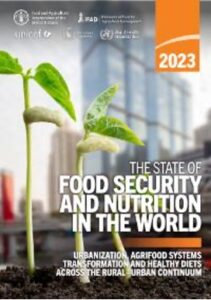 The State of Food Security and Nutrition in the World 2023.
The State of Food Security and Nutrition in the World 2023.
FAO, IFAD, UNICEF, WFP, WHO, 2023. Urbanization, agrifood systems transformation and healthy diets across the rural–urban continuum. This report provides an update on global progress towards the targets of ending hunger (SDG Target 2.1) and all forms of malnutrition (SDG Target 2.2) and estimates on the number of people who are unable to afford a healthy diet. Since its 2017 edition, this report has repeatedly highlighted that the intensification and interaction of conflict, climate extremes and economic slowdowns and downturns, combined with highly unaffordable nutritious foods and growing inequality, are pushing us off track to meet the SDG 2 targets. However, other important megatrends must also be factored into the analysis to fully understand the challenges and opportunities for meeting the SDG 2 targets. One such megatrend, and the focus of this year’s report, is urbanization. New evidence shows that food purchases in some countries are no longer high only among urban households but also among rural households. Consumption of highly processed foods is also increasing in peri-urban and rural areas of some countries. These changes are affecting people’s food security and nutrition in ways that differ depending on where they live across the rural–urban continuum. This timely and relevant theme is aligned with the United Nations General Assembly-endorsed New Urban Agenda, and the report provides recommendations on the policies, investments and actions needed to address the challenges of agrifood systems transformation under urbanization and to enable opportunities for ensuring access to affordable healthy diets for everyone.
Women
For survivors of gender-based violence in French overseas territories, ‘silence prevails’.
Barbara Gabel,France24, 29 July 2023.
According to a report published by French feminist organisation En avant toute(s), life is particularly harrowing for survivors of sexual abuse and gender-based violence in French overseas territories like Martinique, Mayotte and Guadeloupe. The subject is taboo and victims are often so isolated that many don’t speak out. Women in French overseas territories are much more likely to experience domestic violence than those in mainland France. In Martinique and Guadeloupe for example, one in five women suffer from domestic abuse, compared to one in ten on the mainland.
According to a report by French feminist organisation En avant tout(e)s (meaning “full steam ahead” or “onwards” in English) published on July 11, many factors explain the disparity. Poverty, geographical isolation, cultural norms and family pressures all play a role.
The Maputo Protocol, Protecting African women’s rights, accepted 20 years ago on 11 July 2003. Equality Now is releasing a new report – 20 Years of the Maputo Protocol: Where are we now? – summarizing the progress made to date toward the ratification, domestication, and implementation of the Maputo Protocol and highlighting the challenges that remain.
On July 11 2003, African heads of state and government representatives gathered in Maputo, Mozambique, to adopt one of the most important, comprehensive, and progressive legal frameworks for women’s rights the world has ever seen. Twenty years later, the Protocol to the African Charter on Human and Peoples; Rights on the Rights of Women –also known as the Maputo Protocol – remains a crucial instrument in recognizing, promoting and safeguarding the fundamental human rights of women and girls across Africa.
To mark the 20th anniversary of the Maputo Protocol and to promote the continued adoption and implementation of its progressive provisions, a landmark report has been prepared by the Solidarity for African Women’s Rights Coalition (SOAWR), Equality Now, and Make Every Woman Count (MEWC), titled 20 Years of the Maputo Protocol: Where are we now?
Ukraine
Network Reflection: The Program for Welcoming Ukrainian Scientists in Paraná State, Brazil.
SCHOLARS at Risk Network, July 10, 2023.
Paraná is a southern Brazilian state, home to 80% of the Ukrainian immigrants living in Brazil. Thus, it was not surprising that the start of the war in Ukraine in February 2022 touched deeply into the collective soul of the Paranaenses (the people of Paraná). Only three months later, the state’s government, through its funding agency for research and development, the Araucária Foundation, designed and launched a call entitled “Program for Welcoming Ukrainian Scientists,” aiming to fund initiatives to attract and welcome Ukrainian scholars to Paraná, Brazil.
The reaction of the academic community was also immediate, and all major universities of the state submitted multiple proposals. By July, our institution, the Pontifical Catholic University of Paraná (PUCPR), received the first Ukrainian researcher in Curitiba, the state’s capital. The arrival of Prof. Zhana Virna, originally from Volyn National University, Lutzk, resulted from an intense, collaborative initiative involving various academic and administrative departments to facilitate getting her and other scientists out of the conflict zone and into our safe space. Prof. Virna holds a Ph.D. in psychology, is an expert in school violence, and learned about the Araucária Foundation program through a publication on the Ukrainian Ministry of Education website. According to Prof. Virna, who left a son and a granddaughter in Ukraine, “Any change for a person is always a stressful situation — to cross the long distance to Curitiba, on another continent — but the adaptation was easy. And all thanks to the good people, friendships, and kindness I felt.
PUBLICATIONS
Annual Report 2023.
Network of Concerned Historians.
This twenty-ninth Annual Report of the Network of Concerned Historians (NCH) contains news about the domain where history and human rights intersect, in particular about the censorship of history and the persecution of historians, archivists, and archaeologists around the globe, as reported by various human rights organizations and other sources. It mainly covers events and developments of 2022 and 2023.
The complete set of NCH Annual Reports in one pdf file is available at: https://www.concernedhistorians.org/ar/compilation.pdf
This year’s report was compiled and edited by Antoon De Baets and Ruben Zeeman.
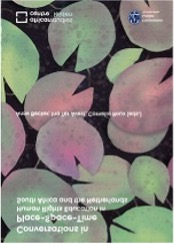 Conversations in Place-Space-Time: Human Rights Education in South Africa and the Netherlands.
Conversations in Place-Space-Time: Human Rights Education in South Africa and the Netherlands.
Anne Becker, Ina ter Avest, Cornelia Roux, African Studies Centre, Universiteit Leiden, 2023. Open Access.
Any analysis of histories and cultures of remembrance, bears testimony to the witnessing of humans who have either lived through the experiences as insiders or who have not lived through the experiences of the past as outsiders. The possibility of bearing witness to (remember) the horrors, trauma, and destitution of the human condition and to consider its implication for human rights education is what this anthology of essays is about. The editors, Anne Becker, Ina Ter Avest and Cornelia Roux, portrayed as insiders, cogently accentuate how human rights violations in South Africa and the Netherlands ought to be expiated through teaching and learning to justify and preserve dignity, self-respect, and freedom towards the advancement of affective life and humanity. Hopefully, through education, it is averred that degradation, inhumanity, and irresponsibility will be undermined and eradicated. The possibility that dignity and decency will remain in place and that it ought to be preserved at all costs even beyond the imagination, and rightfully so, seems to be at the centre of the editors’ concern for the cultivation of human rights education. In this way, apartheid colonialism and other pervasive torments of human and non-human life should be distanced from genuine education encounters.
 The Politics of Children’s Rights and Representation.
The Politics of Children’s Rights and Representation.
Eds: Bengt Sandin, Jonathan Josefsson, Karl Hanson, Sarada Balagopalan, Springer Open Access, 2023. This book is open access, which means that you have free and unlimited access.
Establishes representation and transformation as the intertwined key to understanding of the politics of childhood. Covers issues within systems of education, politics, justice, organizations, and work. Brings together international contributors to provide examples of youth representation and transformation worldwide.
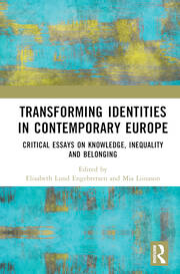 Transforming identities in contemporary Europe.
Transforming identities in contemporary Europe.
Elisabeth L. Engebretsen, Mia Liinason, Routledge, May 2023.
Interdisciplinary in perspective, this book explores contemporary struggles around ‘identity politics’ in Europe, offering a unique glimpse into contemporary tensions and paradoxes surrounding identities, belonging, exclusions and their deep-seated gendered, colonial and racist legacies. With a particular focus on the Nordic region, it provides insights into the ways in which people who find themselves in minoritized positions struggle against multiple injustices. Through a series of case studies documenting counter-struggles against racist, colonialist, sexist forms of discrimination and exclusion, Transforming Identities in Contemporary Europe asks how the paradigm and politics of the welfare state operate to discriminate against the most marginalized, by instating a naturalized hierarchy of human-ness. As such it will appeal to scholars across the social sciences and humanities with interests in race, gender, colonialism and postcolonialism, citizenship and belonging.
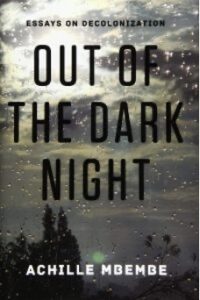 Out of the Dark Night: Essays on Decolonization
Out of the Dark Night: Essays on Decolonization
Achille Mbembe, New York: Columbia University Press, 2021. Published online by Cambridge University Press, 19 August 2021.
Decolonizing Humanity: In his recent book, Out of the Dark Night: Essays on Decolonization, critical theorist Achille Mbembe explores the complexities of decolonisation. In six essays and an epilogue, he intervenes in debates about French democracy, African modernity, the aspirations of postcolonial thought and the possibilities of imagining community on a planetary scale.
In the final essay of the book, Mbembe offers Afropolitanism as the name of a cosmopolitan vision for the future of humanity. ‘As a matter of fact’, he asserts, ‘the destiny of our planet will be played out, to a large extent, in Africa. This planetary turn of the African predicament will constitute the main cultural and philosophical event of the twenty-first century’ (222). Articulating his concept of Afropolitanism, Mbembe reassesses the intellectual, moral and political heritage of African nationalism. What he finds exceptionally salvageable in this heritage is ‘the message of joy in a great universal future equitably open to all peoples, all nations, and all species’ (229). To the extent that it is ‘humanity’ that bears the responsibility of creating this universal future — a humanity that is not given, but instead ‘pulled up and created over the course of struggles’ — it will be instructive to explore the sort of humanity Mbembe imagines.
It is Frantz Fanon, the psychiatrist and militant theorist of decolonisation, to whom Mbembe turns when proposing a politics of ‘ascent into humanity’ (229). Through Fanon, Mbembe finds that decolonisation aims at ‘radically redefining native being and opening it up to the possibility of becoming a human form of being rather than a thing’. This possibility of becoming human requires, on the one hand, the affirmation of a different humanity, ‘the possibility of reconstituting the human after humanism’s complicity with colonial racism’. On the other, it demands becoming one’s ‘own foundation’ in the creation of ‘forms of life that could genuinely be characterized as fully human’.
 Heroes Of Our Existence: The Power Of Love Throughout Human History.
Heroes Of Our Existence: The Power Of Love Throughout Human History.
Élison Silva Santos, Busca Sentido, June 26, 2023.
Embark on a captivating literary journey with this thought-provoking book that explores the profound impact of heroism on our civilization. From its inception, the narrative takes readers on an intellectual adventure, challenging preconceived notions and awakening the potential for transformative change. Delving into the powerful realm of love, the book dissects its pivotal role in healing psychological wounds, fostering personal growth, and driving societal transformation. By examining love’s multifaceted dimensions—eros, philos, and agape—it underscores its essential contribution to finding purpose and fulfillment in life. It confronts the misconceptions surrounding love’s core essence and its effects on relationships and family dynamics. Recognizing the barriers that hinder individuals from realizing their power to create meaningful change, this book celebrates love as a catalyst. It empowers readers to transcend limitations and explore the realm of endless possibilities. Drawing inspiration from the Moon landing as a symbol of enlightened and humanitarian initiatives, it reveals how such endeavors can fuel human advancement and understanding.
Drawing inspiration from Viktor Frankl’s aviation analogy of “crabbing,” this book inspires readers to aspire to an elevated form of heroism. Despite its inherent challenges, noble heroism is portrayed as an attainable goal, achieved through personal growth and the unwavering pursuit of higher ideals.
OPPORTUNITIES
Exhibits, Events, Courses, Calls for Papers
 HDCA 2023 Conference, “Vulnerability, human development and cooperative re-building in turbulent times”, 11 – 13 September, 2023, Sofia, Bulgaria and Online. More information about the conference is available at:
HDCA 2023 Conference, “Vulnerability, human development and cooperative re-building in turbulent times”, 11 – 13 September, 2023, Sofia, Bulgaria and Online. More information about the conference is available at:
Trauma, Crisis and Conflict: Connecting Research and Practice
Gooiland Event Venue, Hilversum, The Netherlands. 28 & 29 September 2023
ARQ celebrates its 50th anniversary. We are proud to invite you to our international conference on the occasion of ARQ’s 50th anniversary. Two days of sharing knowledge and discussing the importance of recognizing, preventing and treating the consequences of trauma, crises and conflict in a globally connected world. ARQ helps with shocking events and psychotrauma. We offer people and organisations customised care, advice and share knowledge. ARQ has all psychotrauma expertise under one roof and is therefore unique in the world.
CONTACTS: Published by the Global Network of Psychologists for Human Rights – www.humanrightspsychology.org
Disclaimer: The website of the Global Network of Psychologists for Human Rights (GNPHR) contains articles, events and news about the domain where psychology and human rights intersect. The information presented in this Bulletin, does not imply that the GNPHR shares the views and beliefs in the articles.
- @GNPHR1
- How to get involved – read how you can contribute to the global network
- Consider contributing a Blog/Commentary
- News and Bulletins from the GNPHR – Subscribe to GNPHR
- Email addresses:
Ways to Participate in Global Network Activities
- Student/young person representation on the GNPHR Steering Committee
Are you a student or young person (under 35 years of age) interested in joining the GNPHR Steering Committee? The GNPHR invites applications. Role description: The terms of reference broadly define the roles of all members of the steering group. Individual steering committee member tasks include : Each member will take responsibility for one of the following: (a) A specific content area or group of areas; (b) A specific project (e.g. survey of human rights reporting mechanisms; survey of educational programs in psychology/human rights, etc); (c) A specific function: for example, organizing a newsletter; soliciting commentary or newsletter blogs; seeking grant possibilities; outreach to general human rights organizations; outreach to psychology organizations or (d) Consultation: Working in collaboration with other organisations where there is a specific issue. In addition, from time-to-time, short-term subgroups may work on specific projects. In addition, for the student member, there would be a specific remit to liaise with other organisations that are focussed on younger people, psychology and human rights. Click here if you are interested in being nominated. - Share Your Experiences and Examples
One of the best ways to illustrate the intersection of psychology and human rights is through example. We are looking for examples of your encounters with human rights issues in your professional life. You might describe a time when you protected (or failed to protect) human rights, or advocated for what you saw as a human rights issue. The events might be in your clinical, research, academic, applied, or volunteer work. Please send your narrative / story (500-1000 words) to Marlena Plavšić (marlena_plavsic@hotmail.com). We will compile these for publication in the GNPHR Bulletin and on the website. Please also indicate if you would like your stories to remain anonymous. - Share your Expertise and Opinions
We invite you to contribute a blog or opinion piece on general human rights issues; human rights education or strategies for raising the profile of human rights within psychology or your professional life. Students are welcome to contribute, including on student needs for learning about and addressing human rights. Please contact the GNPHR Blog editor (blogeditor@humanrightspsychology.org) with ideas for the article you would like to write! - Send articles/news/events
If you come across a human rights article or news, or know of an upcoming hunman rights event, please send for publication in the Bulletin. Send to the Bulletin editor Polli Hagenaars (polli.hagenaars@gmail.com).

